Bridging the Gap: How EdTech and Education Leaders are Shaping the Future Key
Key Takeaways from the EEA Meets EFEE Webinar
On September 10, 2024 the European EdTech Alliance (EEA) and the European Federation of Education Employers (EFEE) came together for an insightful webinar, moderated by Beth Havinga, Managing Director of the EEA. The session featured Daniel Wisniewski, Secretary General of EFEE, and Panagiotis Karamalis, EFEE member and School Leader of Palladio School in Greece, who shared their expertise on the digital transformation of education and the future of learning environments.
Insights from EFEE
EFEE is a large network of education providers representing around 150,000 schools across Europe, and its core mission focuses on improving the quality of management and leadership in schools. During the webinar, EFEE highlighted the urgent need for European education to rethink learning environments in order to stay ahead in the digital age, especially with the rise of AI.
Daniel Wisniewski stressed that the transformation goes beyond merely incorporating EdTech into classrooms. “We are talking about the transformation of the classroom itself,” he said. “We're talking about the transformation of the teaching profession itself. We're talking about a complete makeover of what we know as a school.”
Wisniewski pointed to the current teacher shortage across Europe and emphasised that EdTech has the potential to not only improve learning but also alleviate the workload for teachers by streamlining processes.
“We are talking about the transformation of the classroom itself (...) the transformation of the teaching profession itself. We’re talking about a complete makeover of what we know as a school.”
Criticism of Smartphone Bans
A focal point of the discussion was the wave of smartphone bans across Europe. Panagiotis Karamalis expressed deep concern over these restrictions, particularly for underprivileged schools in remote areas where teachers might rely on students' personal devices to access digital content.
“As a school leader, I’m deeply concerned,” Karamalis remarked. “There is an urgent need to reverse this wave of scepticism and technophobia with solid studies that show embracing technology in the classroom is not a threat, but the only way to prepare students for the future.”
These bans, while intended to minimise distractions, might hinder opportunities for innovation in underfunded areas. Beth Havinga fully supported this and called for a more nuanced discourse around the topic, stressing that neither social media nor large tech like Teams and Zoom were the same as products that were designed specifically for an education environment.
Karamalis called for evidence-based research on the impact of EdTech to counter technophobia, advocating for a balanced approach to integrating technology in classrooms rather than prohibiting it.
“There is an urgent need to reverse this wave of scepticism and technophobia with solid studies that show embracing technology in the classroom is not a threat, but the only way to prepare students for the future.”
Challenges in Adopting Educational Technology
The discussion also looked into the complexities of adopting EdTech solutions, which can involve balancing stakeholder opinions, managing budgets, and ensuring long-term sustainability. Karamalis outlined several reasons why implementations often fail, including:
Fears from teachers and parents
A mismatch between solutions and actual educational needs
Lack of evidence-based proof demonstrating the impact of EdTech
However, there are key success factors that can turn the tide, such as ensuring solutions are reliable, secure, simple to use, and relevant to the specific needs of schools. Karamalis further emphasised the need for a toolbox to easily evaluate existing EdTech solutions and to make them comparable.
Industry concerns highlighted the difficulty in accessing the learner population in Europe, as well as the lower acceptance of experimentation compared to the US. This challenge is compounded by Europe's tendency to formalise and regulate processes more strictly. Additionally, the lack of private funding for developing solutions - more readily available in the US - presents a significant barrier.
Wisniewski pointed out that while there is public and EU funding available, particularly for partnerships, training, and piloting new solutions, there is very limited support for early-stage startups and innovative ideas.
Collaboration Opportunities
One of the most promising aspects of the webinar was the potential for collaboration between the EFEE, EEA, and the broader EdTech industry. Wisniewski extended an invitation to the EEA and industry representatives to join various initiatives EFEE is part of, including:
EducAItion Project: A new initiative focusing on AI in education, with a kick-off event scheduled in October 2024 in Aalst, Belgium.
Educational Leadership Network Europe (ELNE): A broader network about educational leadership with a webinar week, the European Educational Leadership Week, taking place from 10th to 14th of March 2025 and an annual conference in Brussels, bringing together diverse stakeholders.
Education Chatter: EFEE’s YouTube channel where EdTech companies can showcase their products and discuss AI and digitalisation in education.
Conclusion
The EEA-EFEE webinar was a dynamic exchange of ideas and concerns about the future of education in Europe. Both organisations underscored the importance of fostering cooperation between the education sector and EdTech providers. By addressing challenges such as teacher shortages, the rise of AI, and smartphone bans, this collaboration aims to reshape European education and ensure it keeps pace with the digital revolution.
For EdTech organisations and stakeholders looking to be part of this transformation, opportunities abound to engage with EFEE’s networks and initiatives. The path forward requires an evidence-based approach, continued dialogue, and the will to embrace digitalisation for a more efficient and inclusive future in education.
Upcoming Event: Join the first EducAItion workshop in Aalst, Belgium, from October 16-17 2024, to engage in discussions around AI in education and meet key stakeholders from the formal education and EdTech industries. Register here
